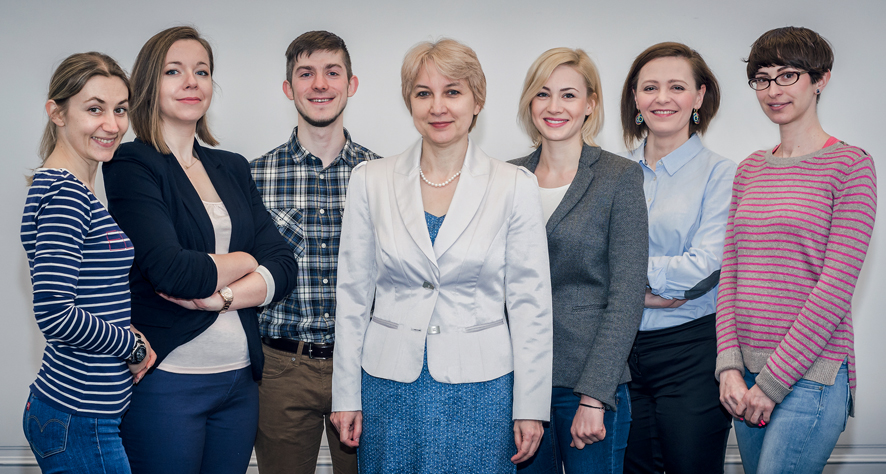- Head of laboratory
- Scientific Staff
- Technician and administration staff
- Research profile
- Current research activities
- Selected publications
- Recent research grants
Head of laboratory

Research profile
Our studies concern the molecular mechanisms of activation of receptors localized in the plasma membrane of immune cells with a focus on signal transduction by TLR4 which serves as a signaling receptor for bacterial lipopolysaccharide (LPS). Activated TLR4 triggers downstream pathways leading to production of pro-inflammatory mediators which can evoke systemic inflammation and septic shock. TLR4 is assisted by CD14 protein anchored in the plasma membrane nanodomains (rafts) enriched in distinct lipids and contribution of those lipids to LPS-inducing signaling is in the center of our studies. We are especially interested in the role of the turnover of PI(4,5)P2, sphingolipids and acylated proteins in LPS-stimulated macrophages. Our aim is to elucidate how signaling complexes of TLR4 are assembled in the plasma membrane, how they interact with the actin cytoskeleton, and how microdomain organization of the plasma membrane affects formation of those complexes and what are mechanism controlling subsequent endocytosis of the receptor. We conduct the studies on cell culture lines, CD14 knockout mice and primary macrophages transiently or stably depleted/overexpressing distinct proteins of LPS-induced signaling pathways. For analyses we utilize an array of molecular biology and immunobiology techniques, and also immunoelectron and confocal microscopy, various biochemical techniques including “click chemistry”, ABE and mass spectrometry. These complementary approaches are dedicated to unravel factors shaping the mode and magnitude of activation of macrophages by LPS and can in the future help to invent new therapeutic tools for the treatment of sepsis.
Current research activities
- examining regulatory role of plasma membrane lipids, sphingomyelin and ceramide, and raft proteins, including CD14 in LPS-induced activation of macrophages. Studies include microscopic and biochemical analysis of an assembly of TLR4 signaling complex, endocytosis of CD14 and TLR4 and immune responses of macrophages depleted or enriched in distinct raft proteins and lipids.
- exploring the role retromer in recirculation of CD14 and TLR4 in LPS-stimulated cells.
- exploring the role of S-acylation (palmitoylation) of proteins in signaling activity of TLR4. These studies include proteomics analysis of changes of S-acylation of proteins based on metabolic labeling of macrophages with palmitic acid analogue followed by “click chemistry” and also on acyl-biotin exchange technique (ABE), and application of mass spectrometry to identify labeled proteins. The goal of these studies is to establish whether modification of proteins with palmitic acid, a typical component of the westernized diet, can affect pro-inflammatory signaling triggered by LPS.
- elucidating the role of plasma membrane lipid, PI(4,5)P2, in LPS-induced production of pro-inflammatory mediators and cell migration. We aim to dissect the contribution of CD14 and TLR4 to signaling pathways which control phosphatidylinositol turnover in LPS-stimulated cells, identify enzymes involved in PI(4,5)P2 generation and depletion in these conditions and reveal effectors of the lipid shaping the response of macrophages to LPS.
Selected publications
Traczyk G., Świątkowska A., Hromada-Judycka A., Janikiewicz J., Kwiatkowska K. (2022) An intact zinc finger motif of the C1B domain is critical for stability and activity of diacylglycerol kinase-ε. International Journal of Biochemistry and Cell Biology, 152:106295.
Ciesielska A., Krawczyk M., Sas-Nowosielska H., Hromada-Judycka A., Kwiatkowska K. (2022) CD14 recycling modulates LPS-induced inflammatory responses of murine macrophages. Traffic. 23:310-330.
Ziemlińska E., Sobocińska J., Świątkowska A., Hromada-Judycka A., Traczyk G., Malinowska A., Świderska B., Mietelska-Porowska A., Ciesielska A., Kwiatkowska K. (2021) Palm oli-rich diet affects murine liver proteome and S-palmitoylome. International Journal of Molecular Sciences, 22:13094.
Ciesielska A., Matyjek M., Kwiatkowska K. (2021) TLR4 and CD14 trafficking and its influence on LPS-induced pro-inflammatory signaling. Cellular and Molecular Life Sciences, 78:1233-1261.
Kwiatkowska K., Matveichuk O.V., Fronk J., Ciesielska A. (2020) Flotilins: at the intersection of protein S-palmitoylation and lipid-mediated signaling. International Journal of Molecular Sciences, 21:2283
Prymas K., Świątkowska A., Traczyk G., Ziemlińska E., Dziewulska A., Ciesielska A., Kwiatkowska K. (2020). Sphingomyelin synthase activity affects TRIF-dependent signaling of Toll-like receptor 4 in cells stimulated with lipopolysaccharide. Biochimica and Biophysica Acta, Molecular and Cellular Biology of Lipids, 1865:158549
Ciesielska A., Hromada-Judycka A., Ziemlińska E., Kwiatkowska K. (2019) Lysophosphatidic acid up-regulates IL-10 production to inhibit TNF-α synthesis in Mϕs stimulated with LPS. Journal of Leukocyte Biology 106:1285-1301.
Sobocińska J., Roszczenko-Jasińska P., Ciesielska A., Kwiatkowska K. (2018) Protein palmitoylation and its role in bacterial and viral infections. Frontiers in Immunology, 8:2003.
Sobocińska J., Roszczenko-Jasińska P., Zaręba-Kozioł M., Hromada-Judycka A., Matveichuk O.V., Traczyk G., Łukasiuk K., Kwiatkowska K. (2018) Lipopolysaccharide upregulates palmitoylated enzymes of the phosphatidylinositol cycle: An insight from proteomic studies. Molecular & Cellular Proteomics, 17:233-254
Recent research grants
Mechanisms controlling endocytosis of CD14 as a targets for regulation of inflammatory responses of macrophages.2021-2014, NCN, Kraków, [2020/39/B/NZ3/02517, OPUS] PI: dr. Anna Ciesielska
The role of diacylglycerol kinase epsilon, an enzyme of the phosphatidylinositol cycle, in the regulation of LPS-induced pro-inflammatory signaling of macrophages. 2019 – 2022, NCN, Krakow, [2018/29/B/NZ3/00407, OPUS] PI: prof. dr. hab. Katarzyna Kwiatkowska
New plasma membrane lipid-dependent mechanisms of regulation of inflammatory responses induced by LPS. 2013 – 2019, NCN, Krakow, [2013/08/A/NZ3/00850, MAESTRO] PI: prof. dr. hab. Katarzyna Kwiatkowska
Role of retromer in a regulation of inflammatory responses of macrophages to lipopolysaccharide. 2017 – 2020, NCN, Krakow, [2016/23/D/NZ3/02212, SONATA] PI: dr. Anna Ciesielska
Palmitoylated proteins of plasma membrane microdomains as regulators of TLR4 signaling. 2016-2020, EU Horizon 2020 research and innovation program under the Marie Sklodowska-Curie grant No. 665735. PI: prof. dr. hab. Katarzyna Kwiatkowska
Lysobisphosphatidic acid – new signaling mediator and factor modulating pro-inflammatory activity of lysophosphatidic acid and lipopolysaccharide. 2013 – 2016, NCN, Krakow, [2013/08/S/NZ1/00844, FUGA ] PI: dr. Anna Ciesielska

